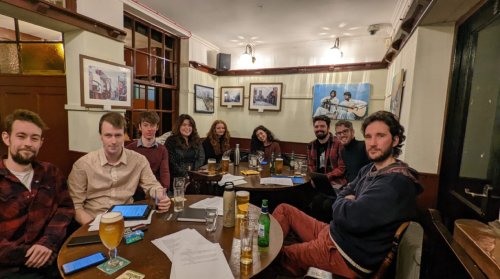Session number 6, 15/02/2023
Posted on: 3 February 2023 by Patrick Brennan in Creative Writing group

The first creative writing meet-up of the new year was held on 15 February...
Due to a change in management at our former haunt and the incursion of a new, rival writing group, this session was held at the new venue of Ye Cracke. At the opening of the session, all-out gang warfare was briefly considered as a means to reclaim our stolen turf on the Knowledge Quarter creative writing scene. However, given that our collective notion of gang warfare consisted mainly of synchronised finger-clicking—à la West Side Story—and several of us lacked the ability to click our fingers (menacingly or otherwise) this idea was promptly shelved. Nonetheless, Ye Cracke provided a cosy booth replete with John Lennon-themed artwork which suited our needs down to the ground.
Tom Kaye kicked off proceedings with a tasting platter of new poems. While varied in both content and form, a sense of the beauty and bleakness of contemporary urban life pervaded his selection. From hipster wine bars through grungey outdoor gigs and cobbled backstreets, the poems conveyed the immediacy and intensity of the speaker’s sensory experience as they navigate these spaces. The inventive presentation of Tom’s poems—line and verse flitting unrulily across the page, refusing to stand in formation, heightened their sense of spatiality and spontaneity.
Next up was David Tierney with another selection of very different poems. His opening and concluding poems, ‘Others’ and ‘Distance’ grappled with the conflicting and contradictory emotions bound up in the break-up of a relationship. Visceral and soothing, tender and violent—an intensity of feeling shone through. Between these two poles, ‘Body of Christ’ and ‘seven earth-like planets’ tapped into different emotions altogether. The former was a (literally) irreverent depiction of a lapsed or lapsing catholic dealing with the metaphysical fine-print of transubstantiation. The latter, by contrast, was a hopeful, albeit trepidatious examination of our place within the cosmos.
Lewis Johnson followed, treating us to the opening chapter of his novel-in-progress, Tenderloin. A scene-setting prologue—more akin to poetry than prose—plunges us right into the abattoir around which the story is centred. The sights, sounds and viscera act as a gut-punch of an intro. From there, in the first chapter, the context of this scene begins to become clearer. A dead-end job in a dead-end town, where poverty, hate crime and stale chips all contribute to a potent sense of hopelessness.
Natalie Wall was next. However, the beginning of her reading was heralded by the arrival of an raucous party in the adjoining booth who, by their chatter, seemed determined to drown out Natalie’s prose. In a last-minute change-of-plans we uprooted our laptops and pints and beat a retreat to a secluded corner behind the bar. While somewhat cramped, our exodus worked to bolster our credentials as persecuted writers within a hostile (read: noisy) society.
Natalie was then able to read without interruption. Her extract—a scene in search of a short story—provided an acerbic and very witty look into the travails of house-buying. Here, an embattled couple attempt to grapple with the jargon and double-speak of an estate agent, whose supernaturally cheerful façade is itself beginning to crack at the end of a long day. Natalie’s pithy back-and-forth dialogue is complemented by minimal, but finely-observed description.
The penultimate reader was Saul Leslie, who read the denouement to his now-completed novella, The House of Tolerance. Following the storied life of Rachelle, the recipient of Vincent Van Gogh’s infamous severed ear, this month’s extract recounted the immediate aftermath of that grisly scene. The frenzied, syphilitic atmosphere of the rather euphemistically-named ‘house of tolerance’ is relayed in sumptuous detail. In a final author’s note we flash-forward to the brothel’s destruction almost sixty years later. This strangely poignant postscript heightened the sense of delicacy and ephemerality which had defined both this particular extract, and the earlier passages from the story which we had listened to in earlier sessions.
To conclude, I read a newly-minted extract from my rapidly-expanding work-in-progress First Shift. In this short (albeit increasingly long) story, I follow a young student called Conn, charting the dissonance between the strenuous and humiliating circumstances of his first ever work shift and the face-saving spin he puts on these events in telling the story to friends. In Conn’s version of events, everyone is at fault except for him and everyone is grotesque apart from him. After my reading I received some welcome feedback, both relating to my use of the past tense—questioning, quite insightfully, whether this was the best way in which to convey the immediacy of Conn’s experiences—as well as relating to a superfluity of spoon-based imagery that I had entirely failed to notice.
All in all, an auspicious start to a new year of new writing!
Keywords: .